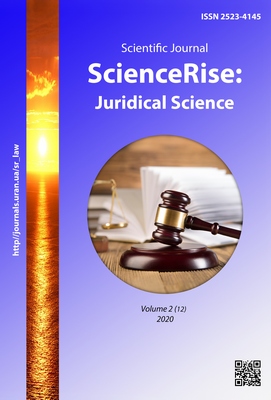Modern authoritarian regime: characteristics and manifestations
DOI:
https://doi.org/10.15587/2523-4153.2020.210869Keywords:
political regime, authoritarianism, authoritarian rule, authoritarian system, political elite, political rights and freedomsAbstract
The article examines the modern authoritarian regime, considers its characteristics and manifestations. The author gives an overview of modern authoritarian regimes. The purpose of this article is to determine the nature and features of the authoritarian regime, as a kind of political regime, as well as the reasons that lead to its emergence or maintenance in the country. It is noted, that the authoritarian regime is not an evolutionary form of state development, it is always a logical consequence of the socio-political processes taking place in the country. It is noted, that it appears against the background of breakthrough processes, when the political system of the state needs changes, but these changes occur under the influence of the political elite, not society, which in turn allows us to identify the preconditions for an authoritarian regime in the state. It is stated, that the authoritarian regime is not an evolutionary form of state development, it does not provide high-quality succession of power, it is unable to offer new trends and transformations of public life due to the inability of one person to change their worldview, adapting to social demands and processes. It is noted, that most authoritarian countries do not proclaim, do not identify themselves in this way, but on the contrary try to position themselves as countries that promote democratic values. Authoritarian regime as such is not perceived by most countries in the world, as it is characterized by unstable, non-transparent and unpredictable development of socio-economic and socio-political processes. The dominance of liberal democracy in the tradition of economic relations demonstrates the tendency of socio-political preferences of most business elites to operate in the conditions of projected democratic regimes. It is concluded, that the authoritarian regime is based on the imperative planting of those values that will contribute to the maintenance of power, and therefore dominated by state ideology, which is planted by the forces and means of state propaganda. Citizens are deprived not only of real influence on the formation of state policy, but also of tools for supervision and control over the activities of the state apparatus
References
- Lints, Kh. (2018). Totalitarnye i avtoritarnye rezhimy. Neprikosnovennii zapas, 4, 16–62.
- Sukhonos, V. V. (2000). Sutnist ta funktsii avtorytarnoho derzhavnoho rezhymu v umovakh perekhodu do demokratii (teoretyko-metodolohichnyi analiz). Kyiv, 185.
- Tomakhiv, V. (2014). Transformatsiia politychnoho rezhymu v nezalezhnii Ukraini: zahalni tendentsii, osoblyvosti definitsii. Ukrainska nauka: mynule, suchasne, maibutnie, 19 (1), 336–342.
- Shypunov, H. (2014). Avtorytarnyi politychnyi rezhym: teoretyko-metodolohichni pidkhody do vyznachennia. Visnyk Lvivskoho universytetu, 5, 329–338.
- Shabanov, M. (2017). Patrymonialnyi politychnyi rezhym ta yoho vidtvorennia: systemni rysy ta spetsyfika. Visnyk Lvivskoho universytetu, 13, 159–165.
- Albertus, M., Menaldo, V., Simpser, A. (2014). The Political Economy of Autocratic Constitutions, Constitutions in Authoritarian Regimes. Cambridge: Cambridge University Press, 53–82. doi: http://doi.org/10.1017/cbo9781107252523.006
- Ezrow, N. M., Frantz, E. (2011). Dictators and Dictatorships: Understanding Authoritarian Regimes and Their Leaders. Continuum, 214. doi: http://doi.org/10.5040/9781501300455
- Gandhi, J., Noble, B., Svolik, M. (2020). Legislatures and Legislative Politics Without Democracy. Comparative Political Studies, 53 (9), 1359–1379. doi: http://doi.org/10.1177/0010414020919930
- Hong, H., Wong, T.-N. (2020). Authoritarian election as an incentive scheme. Journal of Theoretical Politics, 32 (3), 460–493. doi: http://doi.org/10.1177/0951629820910563
- Kyselov, S. (2003). Mira svobody indyvida v derzhavi. Politychnyi menedzhment, 9, 92–101.
- Rotar, N.; Levenets, Yu., Shapoval, Yu. (Eds.) (2011). Avtorytaryzm: Politychna entsyklopediia. Kyiv: Parlamentske vydavnytstvo, 628.
- Roeder, P. G. (2001). The Rejection of Authoritarianism. Postcommunism and the Theory of Democracy. New Jersey: Princeton University Press, 78–96.
Downloads
Published
How to Cite
Issue
Section
License
Copyright (c) 2020 Oleksandr Skrypniuk

This work is licensed under a Creative Commons Attribution 4.0 International License.
Our journal abides by the Creative Commons CC BY copyright rights and permissions for open access journals.
Authors, who are published in this journal, agree to the following conditions:
1. The authors reserve the right to authorship of the work and pass the first publication right of this work to the journal under the terms of a Creative Commons CC BY, which allows others to freely distribute the published research with the obligatory reference to the authors of the original work and the first publication of the work in this journal.
2. The authors have the right to conclude separate supplement agreements that relate to non-exclusive work distribution in the form in which it has been published by the journal (for example, to upload the work to the online storage of the journal or publish it as part of a monograph), provided that the reference to the first publication of the work in this journal is included.









